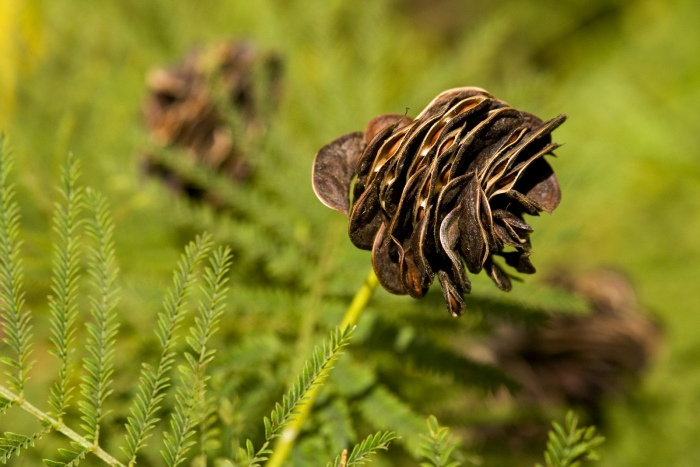Illinois Bundleflower
(Desmanthus illinoensis)
Illinois Bundleflower (Desmanthus illinoensis)
/
/

Patrick Alexander
CC0
Image By:
Patrick Alexander
Recorded By:
Copyright:
CC0
Copyright Notice:
Photo by: Patrick Alexander | License Type: CC0 | License URL: https://creativecommons.org/licenses/by-sa/2.0 | Uploader: Josve05a | Publisher: Wikimedia Commons |






















































Estimated Native Range
Summary
Desmanthus illinoensis, commonly known as Illinois Bundleflower, is a deciduous perennial herb native to the prairies, open woodlands, and riparian areas of the Central and Eastern United States. It typically grows to a height of 3 feet (0.9 meters) and a width of 2-3 feet (0.6-0.9 meters). The plant features bipinnate leaves and spherical clusters of small, white flowers that bloom in the summer, adding a delicate texture to garden settings. The flowers are followed by distinctive seed pods that resemble bundles, which persist into the fall and provide visual interest even after the plant has ceased flowering.
Illinois Bundleflower is valued for its nitrogen-fixing ability, which enriches the soil and supports the growth of surrounding plants. It is often used in native plant gardens, prairie restorations, and as a component in wildlife-friendly landscapes. Easy to maintain, it requires minimal care once established. This plant thrives in full sun but can tolerate partial shade and is adaptable to a range of soil types, including those with varying drainage capabilities. While generally pest and disease-free, it can be susceptible to root rot in overly wet conditions. Illinois Bundleflower is not known to be invasive and is a beneficial addition to ecological gardens due to its ability to attract pollinators and provide habitat for wildlife.CC BY-SA 4.0
Illinois Bundleflower is valued for its nitrogen-fixing ability, which enriches the soil and supports the growth of surrounding plants. It is often used in native plant gardens, prairie restorations, and as a component in wildlife-friendly landscapes. Easy to maintain, it requires minimal care once established. This plant thrives in full sun but can tolerate partial shade and is adaptable to a range of soil types, including those with varying drainage capabilities. While generally pest and disease-free, it can be susceptible to root rot in overly wet conditions. Illinois Bundleflower is not known to be invasive and is a beneficial addition to ecological gardens due to its ability to attract pollinators and provide habitat for wildlife.CC BY-SA 4.0
Plant Description
- Plant Type: Subshrub, Herb
- Height: 2-3 feet
- Width: 2-3 feet
- Growth Rate: Moderate
- Flower Color: White
- Flowering Season: Summer
- Leaf Retention: Deciduous
Growth Requirements
- Sun: Full Sun
- Water: Medium
- Drainage: Fast, Medium, Slow
Common Uses
Bird Garden, Butterfly Garden, Deer Resistant, Drought Tolerant, Edible*Disclaimer: Easyscape's listed plant edibility is for informational use. Always verify the safety and proper identification of any plant before consumption., Erosion Control, Low Maintenance
Natural Habitat
Prairies, open woodlands, and riparian areas
Other Names
Common Names: Prairie Bundleflower, Prarie-Mimosa, Prickleweed
Scientific Names: , Desmanthus illinoensis, Desmanthus brachylobus, Darlingtonia brachyloba, Acacia brachyloba, Acacia glandulosa, Darlingtonia glandulosa, Acuan illinoense, Desmanthus falcatus, Darlingtonia intermedia
GBIF Accepted Name: Desmanthus illinoensis (Michx.) MacMill. ex B.L.Rob. & Fernald